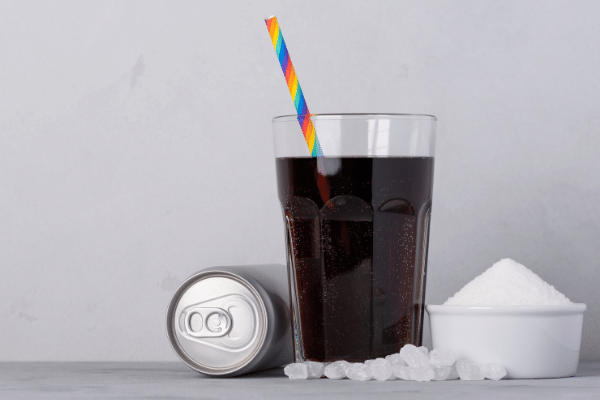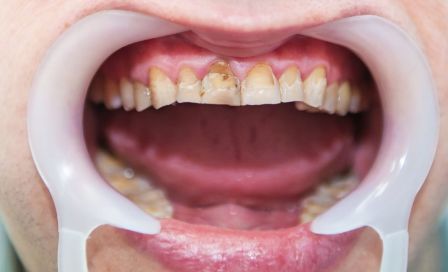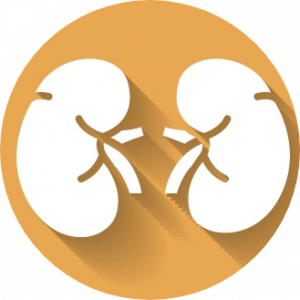Today, just about everyone knows that drinking too much soda is bad for your health. But most people don’t realize just how bad it is for them. Soda has been linked to causing everything from weight gain to osteoporosis.
The adverse effects it has on our body go far beyond adding inches to our waistlines. Sugary beverages directly link to weight growth, and the more we drink, the more we increase our risk of developing diseases such as diabetes, heart disease, and even cancer.
And that’s just the tip of the iceberg. This article will share 13 ways that sugary soda can harm your health.
Why Sugary Drinks are Addictive?

The link between soda and poor health is one of the best-studied topics in nutrition science. Researchers have studied thousands of people to determine whether soda causes health problems.
What is it about soda that makes us want to keep drinking it? Is it the sweet, bubbly taste? The sense of satisfaction we get after quenching our thirst? Or maybe it’s the combination of sugar and caffeine, which can make us feel more alert and ready to take on the world.
The best thing we can do is cut sugary drinks out of our diet completely, but if that’s not possible, we can reduce our intake.
You’re probably aware that drinking too much soda is harmful to your health. But did you know that sugary sodas are linked to a host of severe health problems, including weight gain, diabetes, and heart disease?
Sugar is a carbohydrate that is essential for our body’s functioning, but in excess, it can become a harmful substance. Sugar causes our blood glucose or blood sugar levels to rise, which triggers the pancreas to release insulin. When insulin levels are too high, it can lead to diabetes. Sugar is found in many foods, but sugary drinks such as soda are one of the primary causes of obesity.
In addition to causing weight gain, research shows that too much sugar in our diet can lead to health problems, such as diabetes and heart disease. This is primarily because sugar strongly stimulates our pancreas to produce insulin, which is why high-sugar diets can lead to dangerously high blood sugar levels. One of the biggest concerns regarding sugary beverages is drinking large amounts of them and developing Type 2 diabetes.
13 Ways Sugary Drinks are bad for your health?

In this section, we’ll look at some ways that sugary soda is bad for our health. We’ll examine the research conducted on the topic, and we’ll also share some of our tips on how to reduce your intake of sugary drinks.
1. Causes Weight Gain:

Weight gain is one of the primary adverse effects of drinking soda. People who consume more than one Coke each day are more than 3X more likely to be obese than people who consume less than one soda a week.
2. Risk of Developing Type 2 Diabetes:
Sugary sodas may increase your risk of developing Type 2 Diabetes. The American Diabetes Association estimates that 9 out of 10 people with diabetes do not have Type 1 diabetes. In the past, this disease was known as “insulin-dependent” diabetes, but it is now known as Type 2 diabetes is, also known as non-insulin-dependent diabetes.
Type 2 diabetes is becoming such a widespread problem because, in the last 30 years, the incidence of Type 2Research has shown that drinking sugary soda can contribute to overeating.
University of Minnesota study published in 2015 says that people who drink more sugary drinks may eat up to two more calories a day than those who drink fewer sugary drinks. That’s because liquid calories are more easily absorbed into the body than solid ones, making them a much more effective way of overeating.
3. Overeating:
In addition, research has shown that drinking sugary soda can contribute to overeating. Liquid calories are more easily absorbed into the body than solid ones, making them a much more effective way of overeating.
4. Increases Your Risk of Developing Heart Disease:
One of the primary risks of consuming too much sugar is increasing your risk of developing heart disease. This is mainly because sugar is a known contributor to the accumulation of triglycerides (a type of fat) in the bloodstream.
Triglyceride levels that are too high are a risk factor for heart disease. This is partly because sugar is a known contributor to the accumulation of triglycerides (a type of fat) in the bloodstream. Another concern regarding sugar is that it can also cause the arteries that feed our hearts to narrow, leading to plaque buildup in our arteries.
5. Increases Your Risk of Developing Dementia:
A large body of research suggests that sugary beverages are linked to the development of dementia. In a 2015 article published in the British Medical Journal, clinical researchers reported that people who consume at least two sugar-sweetened beverages per day are at an increased risk of developing dementia.
The leading cause of both Alzheimer’s disease and dementia is the buildup of beta-amyloid plaque in the brains of these diseases. Research shows that people with a diet high in sugar are more likely to develop Alzheimer’s disease than people who eat a diet low in sugar.
6. Increases Your Risk of Developing Insulin Resistance:
Insulin resistance is a condition in which the body’s cells become resistant to the action of insulin. This hormone allows the body to access glucose (sugar) from our food. In a study of more than 5,000 people published in the journal Diabetes Care, researchers found that people who drank sugar-sweetened beverages were more likely to develop insulin resistance than people who did not drink sugar-sweetened beverages.
7. Leptin Resistance:
Leptin resistance is when the body’s cells become resistant to the hormone leptin — it is the hormone that helps regulate appetite and fat storage. Leptin resistance is a risk factor for the development of obesity. In a study of over 1,600 people published in the journal Diabetes Care, researchers found that people who drank sugar-sweetened beverages had higher levels of leptin resistance than people who did not drink sugar-sweetened beverages.
8. Risk of Developing Depression:

The American Psychiatric Association defined significant depression as a disorder when an individual experiences a sad mood or loss of interest for at least two weeks. Previous research has shown that drinking sugar-sweetened beverages can contribute to overeating. Our bodies increase their leptin levels, an important hormone that affects the brain.
9. Increases Your Risk of Developing Cancer:
Previous research has shown a link between soda consumption and the development of various types of cancer. In a study of over 73,000 people published in the journal Cancer, researchers found that people who drank soda were more likely to develop cancer than those who did not drink soda. The leading cause of both colorectal cancer and cancer of the oropharynx (the part of the mouth extending into the throat) is the accumulation of cancer-causing substances known as carcinogens in the body. Carcinogens can be found in both sugar-sweetened beverages and soda, but the primary source of carcinogens in soda is sugar.
Source: https://www.ncbi.nlm.nih.gov/pmc/articles/PMC6614796/
10. The Sugar and Acids in Soda Are a Disaster for Dental Health:

The acids in soda contribute to tooth decay. The leading cause of tooth decay is the accumulation of acids in the body – the same acids found in soda. In contrast, the sugar in soda contributes to the development of cavities. In a study of more than 2,000 people published in the journal Community Dentistry and Oral Epidemiology, researchers found that people who drank soda were more likely to develop tooth decay than those who did not drink soda.
11. Increases Your Risk of Developing Acid Reflux:
Also known as gastroesophageal reflux disease (GERD), a condition in which the lower esophageal sphincter (also known as the valve that controls the flow of food from the stomach to the esophagus) fails to close properly, allowing stomach acid to flow back into the esophagus.
Researchers found that people who drank sugar-sweetened beverages were at an increased risk of developing acid reflux than people who did not drink sugar-sweetened beverages. This was especially the case among people who drank sugar-sweetened drinks every day.
12. Increases Your Risk of Developing Gout:
The American Academy of Family Physicians defines gout as acute arthritis caused by uric acid crystals in the joints. A gout is a painful form of arthritis usually caused by too much uric acid in the body. The most common type of gout is known as symptomatic gout. The leading cause of gout and the accumulation of uric acid in the body is the consumption of sugar-sweetened beverages.
13. Increases Your Risk of Developing Kidney Disease:

The American Congress of Nephrology defines kidney disease as the disease or disorder of the kidneys. The main types of kidney disease are chronic kidney disease and acute kidney injury. Chronic kidney disease is when kidneys slowly begin to fail over time.
The Sugar and the Acids in Soda are a disaster for Your Kidneys. The acids in soda contribute to kidney disease, while the sugar in soda contributes to the development of high blood pressure.
Researchers found that people who drink soda regularly are at an increased risk of developing kidney issues known as renal disease. This was especially the case among people who drank sugar-sweetened beverages every day.
FAQs
1. Is diet soda more beneficial than regular soda?
The health benefits of artificial sweeteners, which are non-calorie sweeteners found in diet soda and drinks, are debatable. Much research suggests that diet soda is not a healthy alternative to sugary soda.
2. Are energy drinks a good choice for a drink?
The name “energy drink” was coined by the beverage industry. Energy drinks are unhealthy because they include as much sugar as soft drinks, enough caffeine to elevate blood pressure, and ingredients with uncertain long-term health implications.
3. Is sparkling or carbonated water harmful to our health?
There have been several claims that fizzy water does not hydrate as effectively as plain water, causes teeth enamel erosion, drains calcium from bones, and is linked to cancer, among other things.
Keep the Sugar Out:
Sugar-sweetened beverages, such as soda, are a disaster for your health. Not only do they contain sugar, which is known to cause weight gain and tooth decay, but they also contain acids, which are known to contribute to the development of heart disease, cancer, and other health issues.
There is a much better alternative to soda – water. By drinking water, you reduce your intake of both sugar and acids, which are known to cause health problems. There are healthy ways to add tasteful flavor to water, such as fresh fruit, spices, and lemon or lime juice. These flavorings have been shown to have many health benefits, including reducing the risk of heart disease and cancer.


